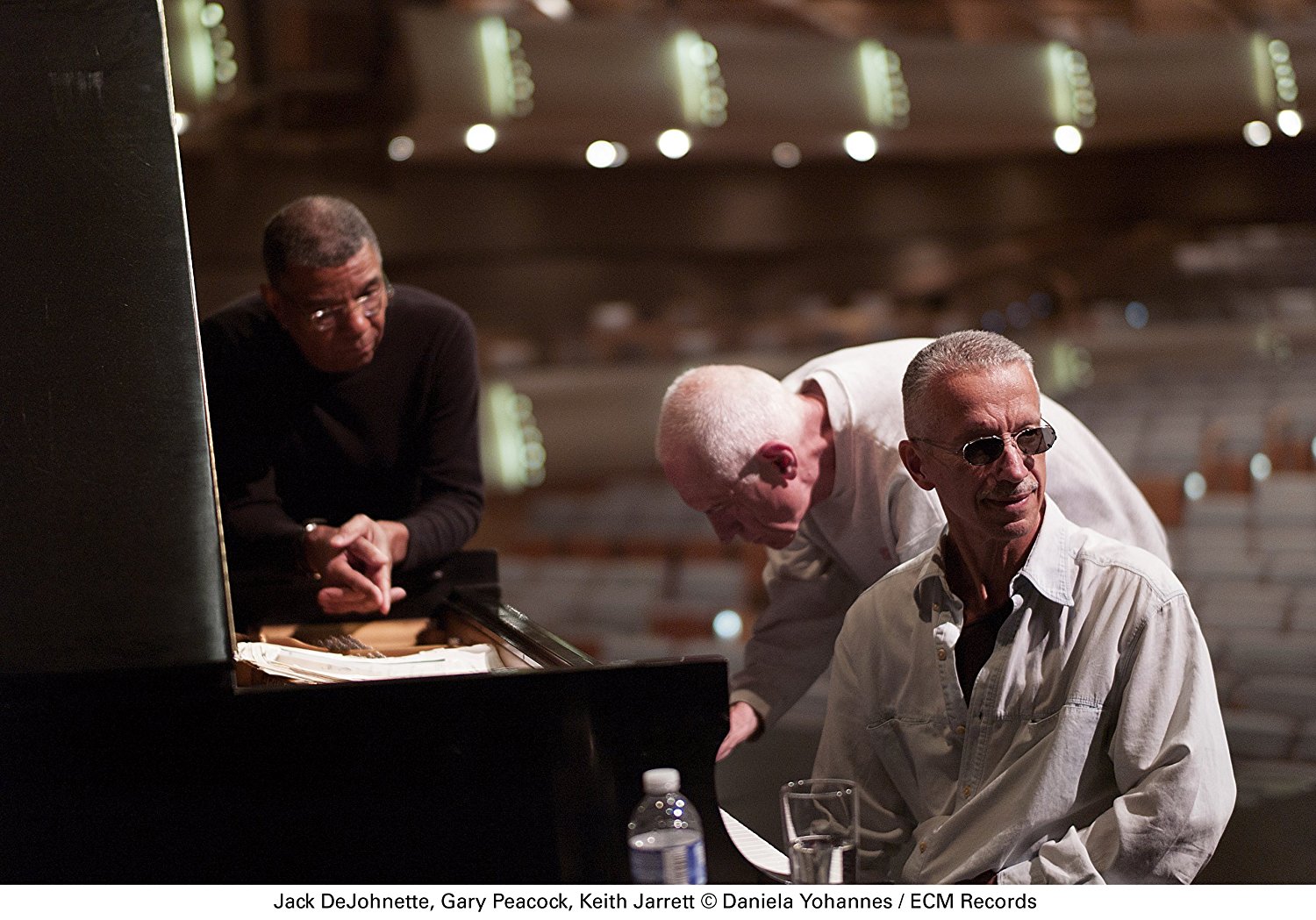A new record from Keith Jarrett is always going to arouse interest, and especially one featuring his long-running (and currently inactive) Standards Trio. ECM’s new release, After the Fall, turns back the clock to the late 90s and offers two hours of this lineup in action. As you’d expect, it’s a fascinating listen.
A little backstory.
After working with several lineups in throughout the 70s, Jarrett hooked up with drummer Jack DeJohnette and bassist Gary Peacock for the two volume Standards LP. As you’d expect, it features the trio working on almost exclusively jazz standards. For most of the next three decades, this lineup would become Jarrett’s primary group.
Don’t let the name fool you, however. Although this group largely plays standards, Jarrett’s trio doesn’t treat them as museum pieces. Jarrett has no problems taking lengthy solos, and DeJohnette’s percussion is hardly restricted to just keeping time.
This show, recorded in November 1998, is a textbook example of the kind of magic the group was capable of, night in and night out. It opens with a lengthy (15 minute!) version of “The Masquerade Is Over,” with an extended intro by Jarrett, followed by Charlie Parker’s old standby “Scrapple from the Apple.” The old bebop tune is given a new tinge by DeJohnette, who rides his cymbals and occasionally works in a few nice drum breaks near the song’s end.
However the highlight of the first disc is their version of “Autumn Leaves.”
This one builds into a tasty solo by Jarrett, who you can vocalizing off mic, and he works himself into a groove, DeJohnette and Peacock pushing him on and on. When DeJohnette starts accenting the off-notes that Jarrett’s playing kicks into another gear, taking little runs up and down; his lengthy solo here is a highlight of this set. It’s followed by Peacock taking the reins for a little while before Jarrett leaps back in, making some light splashes with his piano and leads the group in improvisation.
On the second disc, the group slows the pace a little, but the energy is hardly flagging. Their version of Bud Powell’s “Bouncing With Bud,” pops with energy, while Sonny Rollins’ “Doxy” has Jarrett twisting and turning around Rollins’ tricky figures, making it a nice change of pace.
Throughout this set, Keith Jarrett’s playing is energetic and on point.

It’s all the more remarkable when one considers his health at the time. Between 1996 and 1998, Jarrett took some time off to deal with Chronic Fatigue Syndrome. This show marked his first time back on stage; he doesn’t sound like he’s missed a beat. As for DeJohnette and Peacock, years of playing alongside each other – not to mention their own considerable talents – have them falling into sync, making their lengthy group interplay seem easy.
And indeed, it’s DeJohnette who just about steals the show here.
Throughout a long career that’s seen him in lineups as diverse as Miles Davis’ late 60s bands, a string of ECM projects (Gateway, Special Edition, etc) and many solo albums, he’s built a reputation as one of the most exciting drummers in jazz. Here, as elsewhere in the Standards Trio catalogue, his drumming is all over this record: crashing cymbals here, quick drum breaks there. But he never overwhelms the other players, instead pushing the music forward and, occasionally, acting like a second voice to Jarrett’s piano.
Near the end of the disc comes a nice wrinkle: a treatment of “Santa Claus is Coming to Town,” likely the first time it’s graced an ECM record. And, as an encore, the group launches into a spirited version of Coltrane’s “Moment’s Notice,” where they quickly go into overdrive, playing at a near frantic pace.
At this point, it appears Keith Jarrett’s Standards Trio is done as a working unit.
To the best of my knowledge, they haven’t played together since 2014. Why? Jarrett’s remarked they’ve said all they can, and they’re all getting older. Indeed, Peacock will turn 83 this year, and not many people still tour at that age. So, for one, I’ll take what I can get of this lineup.
With a lengthy catalogue, and a repository of jazz standards, it can be easy to dismiss After the Fall in favour of records either more contemporary or challenging. But you’d be remiss to dismiss this out of hand: At their best, which they are for most of this set, this trio works wonders. The interplay between them is almost magical, improvisation at a high level. After the Fall is a charming record, and one that’ll draw you in even on a casual listen. Recommended.



